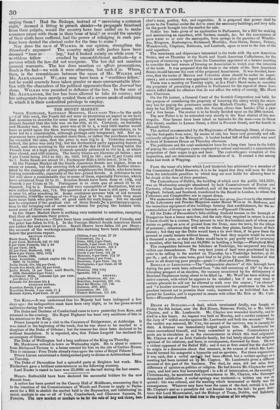From the opinions which we ventured last week to hazard
on The question of the safety and present state of the press, our able contem- porary the Standard has somewhat unwar antably deduced, that we are ' labouring to palliate the wicked inconsistency with -Which the press is treated." The Standard has misconceived the object of Our article oflast week, and must have forgotten all that we had=previeuslY advanced on the subject of the ex officio prosecutions. Of these,. we have on all occasions, from the day on which they were filed, up to the conclusion of the trials to which they led, expressed the most unqua:- lified disapprobation. No one of our contemporaries has reprobated them more decidedly than we have done. We thought that then were, bad in principle ; that Government could gain 'nothing by them ; and that, in his mode of conducting them, Sir 2iTinfEs ScASLETT Was lin:, generous. We thought that .the Puke of Wiatirc.ove*: – - bbi,v4thin . aratig. any compromise or.-4110.4ettr-P-m.' -The -1If: - - P447:10 ' rive as it listed-: but since his Grace was'a a different. inion—since - he chose to crush his newspaper assailant, and in accomplishing that object, had not thought it fitting to forego.the advantages which the law supplied him with, we could not avoid admitting that . the Morning • Journal had merited its fate. Many of our contemporaries saw in the verdicts which were returned against Mr. ALswinza., the.. subversion of. the right of free discussion. 'This we could . not per,. ceive. The right- to•discuss the policy of any Ministry seemed to us: not at all dependent on a right to accuse at random the Premier of - high treason,' or :the -Lord Chancellor of being accessible to bribes. We said, and say still, that all the fair and all the effective instruments, of discussion are . now as much as ever at the Service of the press ;: and that ex officio prosecutions, formidable as they are, can in the long- run trench only on the right which a 'certain class of newspapers might be disposed to arrogate, of dealing in.seiirrility and falsehood. We said, moreover, that the press was independent before the Liam- ing Journal sprang into existence ; and would-lose no jot of in depen- dence were it extinguished to-morrow. We admitted that raov.ern- ment did contrive to cripple the press—but not by means of offical trials. The grinding taxation to which newspapers are subjeted, con- stitutes, in our opinion, the principle which tends to make (Jae: portiroir of the press "crawling," and forces another portion to sec!k- popularibr by unworthy means. Such were our views on a question, which other journals were, agitating; and we are really at a loss Vaperceive how they can be held to involve an approval of "the wick W inconsistency with Which the' press is treated." How does the Standard meet these arguments ?,--In reference, to the remark that the independence of the press is not! dated from the existence of the Morning Journal, the Standard observe's-
" What would be the answer to any one saying that the Seven Bishons ought to be punished in 1688, and asking, were the people of England base and crawling beforethese Bishops were born ? WI:y.this Would be the an- swer—the people of England were not base and crawling before these ve- nerable patriots were born ; but they must be hase ;and crawling after the.
establishment of a tyranny, by the conviction and, punishment. of these mew for the exercise of a common right : or if this illustration be called to re, . spectful to the Morning- Journal, let us ta,ke another which errs as irty,et, upon the opposite side. 'Were the people of England base and crawfinr before John Wilkes was born ?' No; but if the people of England bact.8017. mined, even in the person of that worthless fellow, to the tyranny Of...general warrants and to the power of eternal disqualification by • the .vote of one House of Parliament, they must have become base and crawling from thb.t forward. We hope that there is no cant in this view of the subject—we are conscious, at least of no insincerity, and We do not see how it can be answered' We must .confess ourselves unapt to discover any analogy betweek, the cases Which the Standard has classed together. Granted, that thee people of England must have been base' and crawling had they tole-... rated the persecution of the Bishops -for the 'exercise of al COMItuyiti . right—what follows-?- • Does our ingenious contemporary mean:: to• allege that the Morning. Journal only "exercised a ,cemmon: right+, in preferring charges which it could not substantiate-richargesdiep/f; affecting the moral character of those against whom thew ......iincl having, their intrinsic malignity heightened; 4 .; , urging them ? Had the Bishops, instead of " exercising a common right," deemed it fitting to preach slander—ta propagate falsehood from their pulpits, would the country have beet called on to make common cause with them in their hour of trial? or would the sanctity of their cloth have suffered, had the power of indulging in such pas- time been denied the clerical order for the time to come ?
Nor does the case of Wilms, in our opinion, strengthen the Standard's argument The country might with justice have been deemed "base ar had it looked calmly on while even "a worthless fellow crushed by unconstitutional methods—by a process which the law did not recognize. The law did not sanction general warrants. The law does sanction ex officio prosecutions. Such is the fact—we wish it were otherwise, but such it is. Where, then, is the resemblance between the cases of Mr. WILKES and Mr. ALEXANDER? WILKES may have been a "worthless fellow," but he could scarcely have taken greater or more unwarrantable liber- ties with the characters of his political opponents than the Journal has done. WILKES was punished in defiance of the law. In the case of Mr. ALEXANDER, the law has been allowed to take its course; and his antagonists have merely availed them of a severe mode of enforcing it, which it is their undoubted privilege to employ.



















 Previous page
Previous page